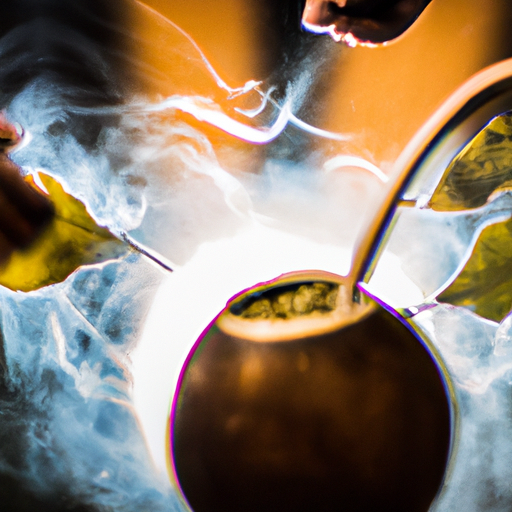As a licensed nutrition expert, I frequently suggest turmeric tea to my clients because of its vast health advantages. Turmeric, with its long history in Ayurvedic healing practices, is celebrated for its anti-inflammatory and antioxidant benefits. Nevertheless, despite its potential health benefits for many, there exist specific people who ought to steer clear of consuming turmeric tea.
Pregnant women should exercise caution when consuming turmeric tea as high doses may stimulate the uterus and potentially cause contractions. Additionally, individuals with gallbladder problems should avoid turmeric as it may exacerbate symptoms such as pain and discomfort. In this article, we will explore who else should not drink turmeric tea and why.
It’s important to understand these restrictions so that you can make informed decisions about your health and wellness journey.
Key Takeaways
- Pregnant women should be cautious when consuming turmeric tea and consult with their doctor before doing so.
- Individuals with gallbladder problems should avoid consuming turmeric and consult with their doctor before consuming in small amounts.
- Individuals taking blood-thinning medications should consult with their doctor before adding turmeric tea to their diet to avoid potential side effects.
- Individuals with diabetes should be cautious when consuming turmeric tea due to its impact on insulin levels.
Overview of the Health Benefits of Turmeric Tea
Turmeric tea has numerous and well-documented health benefits, making it a popular choice for those looking to improve their overall wellness. One primary benefit is its anti-inflammatory properties. Curcumin, the active ingredient in turmeric, can reduce inflammation in the body, alleviating symptoms of arthritis and other inflammatory conditions.
Turmeric has been used as a culinary spice in many cultures for a long time, adding a warm, earthy flavor to dishes like curries, soups, and stews. Drinking turmeric tea is an easy way to incorporate this flavorful spice into your diet while also reaping its health benefits.
While generally safe for most people, turmeric tea may not be suitable for pregnant women. In the next section, we’ll explore who should avoid drinking turmeric tea and why.
Pregnant Women
Pregnant women should avoid consuming turmeric tea due to its potential effects on the developing fetus. Although turmeric has been shown to have many health benefits, it is important to consider its safety during pregnancy.
Some studies suggest that high doses of turmeric may cause uterine contractions and even stimulate menstrual flow, which could lead to complications during pregnancy. Furthermore, turmeric can also increase the risk of bleeding in pregnant women since it acts as a blood thinner. This can be dangerous for both the mother and developing baby.
Pregnant women who are taking blood-thinning medications or have a history of bleeding disorders should especially avoid consuming turmeric tea. Although turmeric tea has numerous health benefits, pregnant women should err on the side of caution and avoid consuming it.
If you are currently pregnant or planning to become pregnant soon, talk with your healthcare provider about any concerns regarding your diet and supplements.
Next, we will discuss why individuals with gallbladder problems may want to limit their consumption of turmeric tea without causing further harm.
Individuals with Gallbladder Problems
If you suffer from gallbladder problems, be mindful when consuming turmeric tea as it may cause discomfort and aggravation to your condition. Turmeric contains a compound called curcumin which can stimulate the production of bile in the gallbladder. This increased production of bile can exacerbate symptoms such as pain, inflammation, and nausea.
Here are some factors to consider if you have gallbladder problems:
- Consult with your doctor before consuming turmeric tea.
- If you’ve had gallbladder surgery, it’s particularly important to speak with your doctor before consuming turmeric tea as it can affect the absorption of fat-soluble vitamins.
- Start with a small amount of turmeric tea at first and monitor any symptoms or side effects.
- Consider taking supplements that contain curcumin instead of consuming turmeric tea directly.
- Avoid using excessive amounts of turmeric in cooking if you’ve experienced gallbladder pain in the past.
Individuals taking blood-thinning medications should also exercise caution when consuming turmeric tea. While this spice has many health benefits, its ability to thin blood may interfere with certain medications.
In the next section, we’ll discuss who should avoid drinking turmeric tea if they’re taking blood-thinners.
Individuals Taking Blood-Thinning Medications
If you’re taking blood-thinning medications, it’s important to be aware of the potential interactions that may occur when consuming certain foods and beverages. One such beverage that should be consumed with caution is turmeric tea. This is because turmeric contains a compound called curcumin, which has anticoagulant properties that can increase the risk of bleeding.
Side effects from consuming too much turmeric tea while on blood thinning medications include easy bruising, prolonged bleeding after injury or surgery, and nosebleeds. It’s essential to consult your doctor before adding turmeric tea to your diet if you’re on any blood-thinning medication to avoid these side effects.
Dosage also plays a key role in determining whether turmeric tea is safe for individuals taking blood thinners. Consuming small amounts of turmeric as part of your daily diet or drinking a cup of turmeric tea occasionally is generally safe for most people on blood-thinning medication. However, excessive consumption of large quantities can cause adverse side effects that are best avoided by individuals taking these medications.
Individuals with diabetes should also be cautious when consuming turmeric tea due to its impact on insulin levels.
Individuals with Diabetes
For those with diabetes, you’ll want to be aware of how turmeric can affect your insulin levels. Turmeric contains a compound called curcumin that has been shown to increase insulin sensitivity and lower blood sugar levels. While this may sound promising for individuals with diabetes, the effects of curcumin on blood sugar are not yet fully understood and more research is needed.
To manage diabetes effectively, it’s important to maintain stable blood sugar levels throughout the day. Adding turmeric tea to your diet may cause fluctuations in blood sugar levels, which could be harmful for individuals with diabetes. Instead of relying on turmeric tea as a remedy for lowering blood sugar levels, consider incorporating other proven methods such as regular exercise, healthy eating habits and medication prescribed by your doctor.
If you’re looking for alternatives to turmeric tea that won’t interfere with your diabetes management plan, there are plenty of options available. Green tea and chamomile tea have both been shown to improve blood glucose control and reduce inflammation in people with type 2 diabetes. Additionally, cinnamon has been found to lower fasting blood glucose levels in people with type 2 diabetes when taken regularly as a supplement or added to food.
Individuals with iron deficiency may also want to take precautions before consuming turmeric tea due its potential interaction with iron absorption.
Individuals with Iron Deficiency
As mentioned earlier, individuals with diabetes should avoid drinking turmeric tea due to its potential effects on blood sugar levels. However, there’s another group of people who may want to steer clear of this beverage – those with iron deficiency.
Iron plays a crucial role in the body’s production of hemoglobin, which carries oxygen throughout the bloodstream. When someone has an iron deficiency, their body is unable to make enough hemoglobin and they may experience symptoms such as fatigue, weakness, and shortness of breath.
While turmeric does offer some health benefits, it’s not a good source of iron. In fact, consuming too much turmeric can actually inhibit the absorption of iron from other sources. For individuals with iron deficiency or those at risk for it, it’s important to focus on incorporating iron-rich foods into their diet or taking supplements as directed by a healthcare professional.
If you’re someone who struggles with low iron levels or anemia, don’t despair! There are plenty of alternative sources of this vital nutrient that you can incorporate into your diet. Foods like red meat, leafy greens (such as spinach), beans and lentils are all excellent sources of dietary iron. If you’re vegetarian or vegan and looking for non-animal-based options, consider incorporating dried fruit (such as apricots), nuts and seeds (like pumpkin seeds), fortified cereals and breads or even blackstrap molasses into your meals.
Moving forward onto our next topic about individuals with allergies…
Individuals with Allergies
Individuals who suffer from allergies may want to be cautious when consuming turmeric as it has been known to cause allergic reactions in some individuals. Common allergies that people may have include pollen, dust mites, and food allergies. However, turmeric can cause a different type of allergy called contact dermatitis, which is an allergic reaction that occurs on the skin after coming into direct contact with turmeric.
Potential side effects of consuming turmeric for individuals with allergies can range from mild reactions like hives or itching to more severe symptoms such as difficulty breathing or anaphylaxis. It’s important to note that not everyone who is allergic to turmeric will experience these symptoms and the severity of the reaction can vary from person to person.
If you have a known allergy to any type of spice or herb, it’s best to consult with your doctor before adding turmeric tea to your diet.
In the next section, we’ll discuss individuals with liver disease and how they should approach drinking turmeric tea. While this topic may seem unrelated at first glance, studies have shown that excessive consumption of certain herbs and spices (including turmeric) can exacerbate liver damage in those with pre-existing liver conditions.
Individuals with Liver Disease
If you have liver disease, it’s important to be aware that excessive consumption of turmeric can worsen your condition. Turmeric tea benefits are widely known and celebrated, but in the case of liver disease management, caution must be exercised.
For example, a study found that a patient with hepatitis C experienced elevated liver enzymes after consuming large amounts of turmeric supplements. While turmeric has been shown to have anti-inflammatory properties and may even help protect against liver damage, it’s essential to consult your healthcare provider before adding it to your diet. They can advise you on how much is safe for you based on your unique health situation.
If you’re looking for alternatives to turmeric tea for liver health, there are several options available. Milk thistle is an herbal supplement that has been used for centuries to support liver function. It contains silymarin, an antioxidant that helps protect the liver from damage caused by toxins and inflammation. Dandelion root tea is another option worth exploring; it has been shown to improve bile production and flow, which aids in digestion and detoxification processes.
It’s crucial to remember that some medications may interact with both turmeric and other herbal supplements used for liver health. In the next section, we’ll discuss potential interactions with medications and how they can affect your overall health outcomes without compromising the benefits of natural remedies like milk thistle or dandelion root teas.
Potential Interactions with Medications
Be careful about mixing medications with natural remedies for liver health, as this can have a significant impact on your overall well-being. Turmeric tea is a popular natural remedy that has been used to improve liver function. However, it is important to be aware of possible interactions between turmeric and certain medications.
Turmeric contains compounds that may interact with blood thinners, such as aspirin or warfarin. This can lead to an increased risk of bleeding or bruising. Additionally, turmeric may interfere with the absorption and effectiveness of certain drugs, including chemotherapy medication and thyroid hormone replacement therapy.
When preparing turmeric tea for liver health, it is important to follow dosage guidelines and prepare it safely. Too much turmeric can cause stomach upset or even ulcers in some individuals. It’s recommended to not exceed 3 grams per day of curcumin (the active ingredient in turmeric).
To prepare turmeric tea safely, boil water and add one teaspoon of ground turmeric root per cup of water. Let the mixture simmer for 10 minutes before straining.
While turmeric tea has many potential benefits for liver health, it is important to be cautious when taking medications alongside natural remedies. Possible side effects and dosage guidelines should always be considered when incorporating any new supplement into your routine.
As we move forward in discussing who shouldn’t drink turmeric tea, keep in mind these potential interactions with medications if you’re currently taking any prescribed drugs.
Summary of Who Should Not Drink Turmeric Tea
Hey, you might want to know who’s better off steering clear of this spicy drink. While turmeric tea is generally safe for most people to consume, there are certain groups of individuals who should avoid it due to potential health risks.
Firstly, pregnant women should be cautious when drinking turmeric tea. Although research on the safety of consuming turmeric during pregnancy is limited, some studies suggest that high doses of curcumin (the active ingredient in turmeric) may increase the risk of miscarriage or preterm birth. It’s best to consult with a healthcare provider before adding turmeric tea to your diet if you’re expecting.
Secondly, individuals with gallbladder problems should avoid consuming large amounts of turmeric as it can stimulate bile production and worsen symptoms. Those with gastroesophageal reflux disease (GERD) may also experience heartburn or acid reflux after drinking turmeric tea due to its acidic nature.
Lastly, those taking certain medications such as blood thinners or diabetes medications should exercise caution when consuming turmeric tea. Turmeric has blood-thinning properties that can interact with anticoagulant drugs and increase the risk of bleeding. Additionally, high doses of curcumin may lower blood sugar levels and interfere with diabetes medication.
To summarize, while turmeric tea offers numerous health benefits for most people, it’s important to be aware of potential risks and side effects before incorporating it into your daily routine. If you fall into any of these categories mentioned above or have any concerns about adding turmeric tea to your diet, speak with a healthcare professional first and always follow recommended dosage guidelines.
| Positive Effects | Negative Effects |
|---|---|
| Anti-inflammatory properties | Risky for pregnant women |
| Antioxidant properties | Can worsen symptoms for those with gallbladder issues |
| Improved brain function | May cause heartburn or acid reflux in those with GERD |
| Lowered risk of heart disease | Can interfere with blood-thinning and diabetes medications |
Frequently Asked Questions
How is turmeric tea prepared and what are the recommended serving sizes?
When it comes to preparing turmeric tea, there are various methods to choose from. One of the easiest ways is to boil water and add a teaspoon of ground turmeric powder or grated fresh turmeric root. Let it simmer for about 10 minutes before straining out any solid pieces.
You can also add other ingredients such as ginger, honey, or lemon for added flavor and health benefits. As for serving suggestions, one cup per day is generally recommended to reap the benefits of this powerful spice. However, it’s always best to consult with your healthcare provider first if you have any underlying medical conditions or are taking medication that may interact with turmeric.
Can turmeric tea be consumed by children?
Yes, turmeric tea can be consumed by children in moderation. It’s important to note that children shouldn’t consume the same dosage as adults. The recommended Child’s Dosage for turmeric tea is 1/4 to 1/2 teaspoon per day.
Turmeric has a variety of benefits for children, including its anti-inflammatory and antioxidant properties, which may help with immune function and brain development. Additionally, turmeric has been shown to potentially improve digestion and manage blood sugar levels in children.
However, it’s always best to consult with a healthcare professional before giving any supplements or herbal teas to your child.
What are the potential side effects of drinking turmeric tea?
Let me tell you, drinking turmeric tea is like taking a magic potion for your health! But just like any other magical remedy, there are possible complications, interactions, and precautions that come along with it.
While the health benefits of turmeric tea are vast – from reducing inflammation to improving brain function – there are also risks associated with consuming it. Possible side effects include stomach upset, nausea, and dizziness. It may also interact with certain medications, so be sure to check with your doctor before adding it to your daily routine.
Overall, turmeric tea can be a great addition to a healthy lifestyle, but it’s important to weigh the potential risks versus rewards and talk to your healthcare provider before starting any new supplement regimen.
Is it safe to drink turmeric tea while breastfeeding?
As a breastfeeding mother, it’s understandable to have concerns about what you consume. While turmeric tea is generally safe for consumption, it’s important to be cautious of any medication interactions. Turmeric may interact with blood thinners and medications that reduce stomach acid, so it’s best to consult with your healthcare provider before adding turmeric tea to your diet.
Additionally, excessive amounts of turmeric may lead to an upset stomach or diarrhea in both the mother and baby. While there isn’t enough research on the effects of turmeric on breastfeeding infants, consuming moderate amounts should not pose a significant risk.
As always, it’s best to err on the side of caution and speak with your doctor if you have any concerns about consuming turmeric while breastfeeding.
Can turmeric tea help with weight loss or management?
Oh my goodness, let me tell you about the amazing benefits of turmeric tea for weight loss and metabolism!
This powerful drink has been shown to increase metabolism and aid in weight management. The active compound in turmeric, curcumin, has been found to have anti-inflammatory properties that can help reduce inflammation in the body which can lead to weight gain.
Additionally, curcumin has been shown to improve insulin sensitivity which can also contribute to healthy weight management. So if you’re looking for a natural way to boost your metabolism and support your weight loss goals, try incorporating turmeric tea into your daily routine!
Conclusion
Well, it seems that turmeric tea has a lot of potential health benefits for many people. However, there are certain individuals who should avoid drinking this popular beverage due to its interactions with medications or potential negative effects on certain medical conditions.
If you fall into any of the categories mentioned above – pregnant women, individuals with gallbladder problems or liver disease, individuals taking blood-thinning medications, or those with allergies and diabetes – it’s best to avoid drinking turmeric tea altogether. This’ll help prevent any unwanted side effects and ensure that you stay healthy and safe.
In conclusion, while turmeric tea is generally considered safe for most people to drink in moderation, it’s always important to be aware of any risks associated with consuming certain foods or beverages. By knowing who should not drink turmeric tea and why, you can make informed decisions about your health and well-being. So if you’re unsure whether or not this beverage is right for you, it’s best to consult your doctor before giving it a try.










